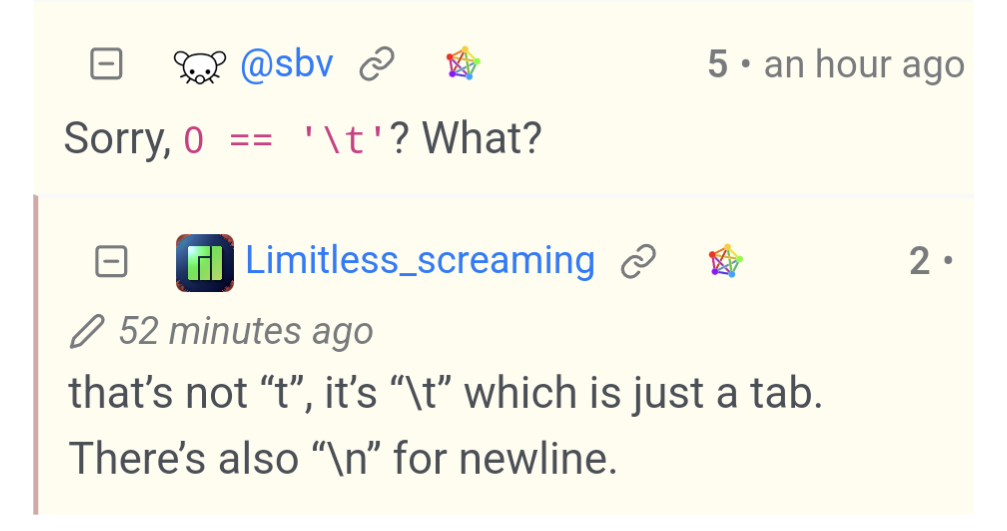== is a heathen with no rightful place except equality to null. All praise ===
That’s what I used to think but it turns out to be the most Christian operator there is.
Eval works in mysterious ways
I Object to your terrible pun
Sorry,
0 == '\t'? What?that’s not “t”, it’s “\t” which is just a tab. There’s also “\n” for newline.
It still makes no sense though
If " " wasn’t equal to 0, it wouldn’t make sense, but since a string containing a space equals 0, you’d expect the same to apply to a string containing a tab or a newline. (or at least I’d expect that)
I admit I have never dabbled in javascript, despite being a proficient programmer. I now dread to ask… would any string that contains only whitespace == 0? " \t\n \t " for example?
Yes, it would. Just like a string of spaces
" " == 0, but it isn’t that bad;===is Javascript’s version of==in other languages, and, thus, you should be using it if you don’t want that wonkiness.==is just for convenience, like when you want to make sure that the user didn’t leave the form empty and the button shouldn’t be greyed out, and other UI stuff. Without these kinds of features JS wouldn’t be used in so many toolkits.Ok, I always mistakenly assumed === was the identity operator in JS, too. TIL, thanks! As much as we like to poke fun at JS, every time I’m taught the rationale behind some aspect of it, I find it redeeming and even a little endearing.
The explanation given to you makes it sound like
==was deliberately designed to be a more convenient version of===, but what actually happened was that==used to be the only equality operator in JavaScript, which meant that if you didn’t want it’s auto-coercing behavior then you needed to go out of your way to add additional type checks yourself. Because this was obviously a tremendously inconvenient state of affairs, the===operator was introduced later so that you could test for equality without having to worry about JavaScript doing something clever underneath the hood that you weren’t expecting.
deleted by creator
It’s a slash-t in the comment. Maybe kbin has different rendering rules for comments?

Oh, in that case I replied to @MinekPo1 with my answer to that. BTW can you see the slash in:
\tand"\t".I see a forward slash:

My bad. I just edited it.
"\t"\tIt’s displaying correctly on Lemmy.world. So it seems like another Kbin only issue.
yeah but why is a single character string containing a tab equal to zero ???
That would be weird if a string containing a space wasn’t equal to 0
" " == 0, but that’s not the case in JS. If you think that""and" "being equal to 0 is weird then I agree, but since they are, you should expect"\t"and"\n"to equal 0 too.The
==operator in JS will try to cast the things being compared and do all kinds of ‘smart’ assumptions about what equality means. This is why everyone uses===instead…Unless you enjoy inviting the chaos.
deleted by creator
Yeah, it’s
true. I knew all the other ones, had to put that one in the dev tools console to believe it. I was just happy to know === continues to be sane in that comparison.You have to remember that the underlying principle of JavaScript seemed to be “never throw an error”, even if what it’s being told to do is weapons grade bollocks.
Are people really not using the strict equality operator?
It’s still pretty bad that the normal equality operator is as bad as it is.
If you’re provided a tool that solves a problem, I don’t really get ignoring that and continuing to focus on that solved problem as if it weren’t solved because you think all the tools should solve it on principle
That’s a little bit like saying, “I don’t understand why people continue to complain about the landmine sitting right there on the ground. We’ve painted it red so you can easily walk around it, so how has the problem not been solved?”
Linters are standard practice in any decent shop. You want to change the language to destroy backward compatibility for one already-solved issue
I think nobody said anything about wanting to fix this. We’re just making fun of how absolutely dumb this is.
Land mines are painted red in my shop. You want to change the language to remove a land mine that everyone competent already knows enough to step around. The problem has already been solved, so why are you continuing to complain about it?
Just to be clear, I’m not actually calling for JavaScript to change, I’m just pointing out that people are right to point out this as being a problem. Having said that, if everyone competent uses linters now so that this feature isn’t used in practice anymore, then getting rid of it shouldn’t even break anything, and arguably code which would break is already broken because it uses an operator that no one should be using, so you shouldn’t be using this code anyway.
Using linters in a professional setting is more like moving all your actual employees into a different office and letting them use robot avatars in the original office who can never step on that landmine.
The benefit of this is that millions of other robots continue to depend on the original office being exactly as it is and many of them will never change or update, nor is their any need for them to.
Breaking backwards compatibility on the web needs much better reasoning than ‘I don’t want to use a linter’.
I can sort of get down with what you’re saying, but on the other hand, we all have design constraints, inside and outside of programming, I think this is a very minor one
Sure, but it is also a very gratuitous and pointless design constraint.
“The trinity makes as much sense as Javascript” is a vulgar condemnation of Christian dogma.
Violating the transitive property? Go home JavaScript, you’re drunk.
Fuck this language with a pineapple
Lots of silliness indeed, yet I can’t remember the last time I had to use a non-strict comparison.
Yes, it’s been established that you can still use JavaScript, and it will only backfire sometimes, even though it’s a bad language. And yet, people try to use it where it’s not even required.
This never gets old lmao
As a person who is coding adjacent (I work with basic SQL and VBA, once learned but never used HTML & CSS, learned some C+, some JavaScript…) I don’t fully understand most of the memes here, but it feels like I’m learning a bit through immersion like being a non-native speaker in a foreign land. It’s a fun ride.
===is just==with extra stepsIt’s actually the other way around. == has to perform type coercions as part of its equality algorithm, whereas === does not, so == has more steps.
It’s to be REALLY sure
I don’t work with web stuff, why is js so weird? Can you write a website in other languages, like c# or python?
Can you write a website in other languages, like c# or python?
sure, as long as it compiles to javascript
But the browser can’t handle other languages? That seems a bit silly
There’s a push towards WebAssembly. Officially it’s not supported yet, but most browsers can handle it. I don’t know how mature the project is though.
But yeah, essentially everything on the web is JS.
Even webassembly needs a JS stub loader right now. I still can’t believe that’s a requirement.
Sure, but you can get frameworks that generate that for you. I’ve written whole webpages in WASM without writing any JS.
You don’t get around reading JS documentation, though. Especially the DOM API is just documented as JS, and you basically hope that your framework makes it obvious enough how to write that in your non-JS language of choice.
This is exactly the reason why I can’t believe that was ever a requirement. I would have crazy respect for webassembly if it could stand on it’s own as it would allow people to completely move away from JS, but if JS is still in the stack in any way it will introduce a (even if it is minimal) compatibility and maintenance cost in the long run.
I used to think so, too, but on the one hand, the DOM API is absolutely massive. Going through the standardization, implementation and documentation process another time would take decades.
And on the other hand, a language-agnostic API in WebAssembly would mean specifying it WebAssembly itself. And well, it’s Assembly-like, so what’s currently a single line for calling a JS function would turn into tens of lines of low-level code.
Ultimately, you’d want code from some other high-level language to give you a summary of how you may need to call your language-specific wrapper. In practice, that’s likely even worse than translating it from JS, because the high-level call isn’t standardized.
i believe they plan to remove that requirement? at least i know they are trying to use a native wasm<->dom api instead of wasm<->js<->dom, which is slow
Big if true, do you have a link to follow that development? I’ve been curious about some languages that compile to JS+WASM but I’ve been waiting for something like this to finally cut out the middle man and give me an excuse to learn WASM directly.
its just what i have heard.
If they could, JavaScript wouldn’t be nearly a popular
There’s actually in theory all the pieces in place to use a different scripting language, because in the early days, there really were multiple. But yeah, the massive DOM API is only really standardized+implemented+documented for JS, so you don’t get around it in the end.
As the others said, though, WebAssembly is starting to become a thing and the JS boilerplate for calling the DOM API can be generated for you.
When you see the entire world agree to one standard about anything, leave it the fuck alone.
:)
Or wasm!
Most of the weirdness comes from being designed for the web, and specifically for working with forms. The value of a form field will always be a string, which is a simple and straightforward idea, but then the trouble showed up when we tried to make it more convenient to work that way.
Actually, most of the weirdness comes from having been originally designed in a matter of 10 days by a single engineer working to accommodate a tight release schedule.
I mean, do you think that has more explanatory power though? The type coercion rules are actually more elaborate with == than necessary for equality checking, because it was intended as a clever convenience for working with strings. If it was really all about the short timeline, wouldn’t you just skip that and do a more straightforward equality comparison, like the algorithm that === implements?
Besides, it’s not like everything in the language was conceived and implemented in those 10 days. The language has been evolving steadily since then. I’m not even sure if the modern == comparison algorithm worked that way in the first iteration.
Personally, I find it more useful to understand the context that lets me say “that’s a quirky consequence of a sensible principle,” rather than blaming it on the “ten days” legend generically.
I think the “ten days” explanation has the merit of being charitable, because it implies that Brendan Eich wouldn’t have made such short-sighted design choices under more favorable circumstances.
(I do not believe that it’s a “sensible principle” to treat text as such a fundamental form of data that a basic language feature like the equality operator should be entirely shaped around it. Surely the consequences of building an entire language around text manipulation should be apparent by considering how awkward Posix-style shells are for any nontrivial scripts.)
Well… The circumstances were that he was asked to whip up a little scripting language, that felt a little like Java and a little like Scheme, which could be used to add simple manipulations and interactions to web pages. Specifically to web pages. Not webservers, mobile apps, databases, banking systems, physics simulations, robotics… Only web pages. And nobody had even conceived yet of something like Google Sheets-- It was simple HTML forms and DOM manipulation.
IMO in that context, it makes alot of sense. I think it was probably still the wrong decision-- definitely with the benefit of hindsight, and quite possibly even at the time, even in that narrow context. Way more trouble than it’s worth.
But it’s beneficial to know that there was a principled (if misguided) reason behind it, that ties into the nature and history of the language-- It’s not simply “dude was in a hurry and not thinking.” Both are kinda true, but the former perspective helps us understand something useful, whereas the latter doesn’t get us anywhere interesting.
TBF he probably had know way of knowing that the language he was creating would one day end up being as popular as it is now.
I guess the moral of the story is that you can never really predict what long term consequences your decisions might have down the road.
What software isn’t?
Can you write a website in other languages, like c# or python?
Yeah, anything that outputs HTML and CSS can do so. There’s a module for Apache to write webpages in Python (
libapache-mod-python) and I’m p sure someone somewhere made a module to do it in Rust already except they’re infighting over whether tag parsing in it should be markedunsafe.For that matter you do can write web pages in your shell eg.:
bash, that’s what CGI is all about.I guess why it’s weird because of the loose rules it follows, like what is mentioned about === and ==. There is WebAssembly which kinda acts like Javabyte code or CIL there used to be huge hype that it’s going to replace JavaScript, though it’s not used that much today. I think why there is low adoption is mainly because JavaScript is good enough, it’s widespread and easy to learn.
Gonna show this to my Discrete math professor
A few years back I came to the conclusion that the holy trinity in Christianity are three levels of abstraction: the son => God walks on earth and tangible, the father => God in heaven untangible but still reachable by speech, holy spirit => God in who knows where.
Then I thought that as a way of imparting the thought that any level of abstraction of the universe would also be inhabitated by God, those which we can sense, and those where our senses can’t reach. The idea that omniprescense is not only limited to our dimension.
I’m not sure if that is the original meaning but is a way of seeing it that I can relate to, since I’ve always been akeen to a more abstract idea of God, and not so much to a figure that praises itself of thought, which is a human attribute.
As far as I can tell, the doctrine of the trinity served political rather than logical purposes back when it was put in writing in late antiquity, and since then it’s just been the doctrine. If you want to believe, you just have to believe and not think about it too hard, like the video says.




















